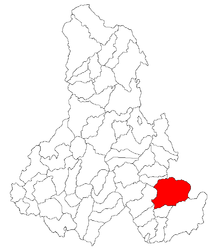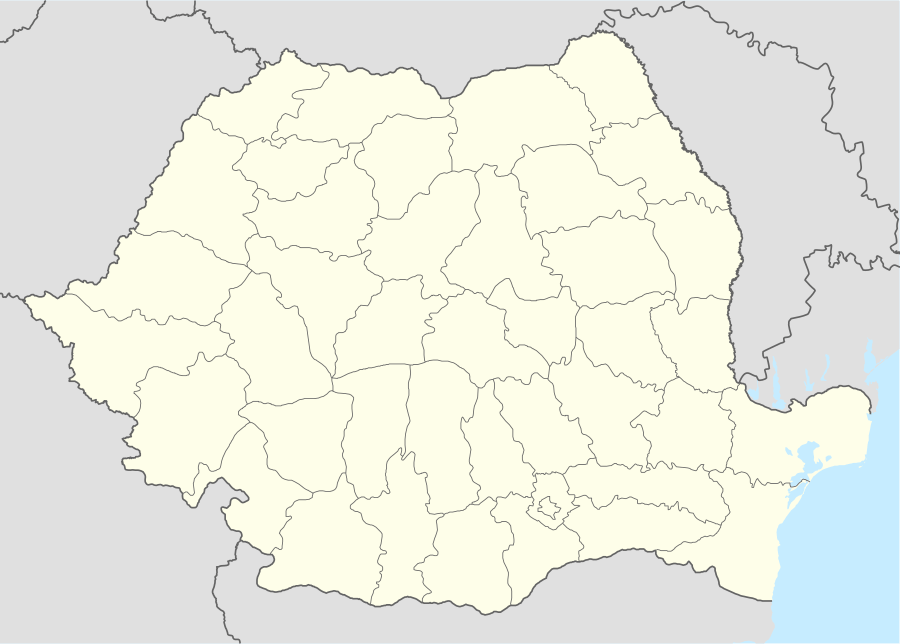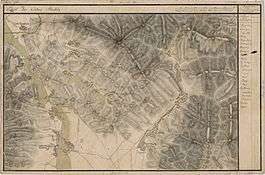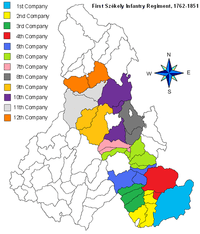Ciucsângeorgiu
Ciucsângeorgiu (Hungarian: Csíkszentgyörgy [ˈt͡ʃiːksɛɲɟørɟ]) is a commune in Harghita County, Romania. It lies in the Székely Land, an ethno-cultural region in eastern Transylvania.
Ciucsângeorgiu Csíkszentgyörgy | |
|---|---|
 Location in Harghita County | |
 Ciucsângeorgiu Location in Romania | |
| Coordinates: 46°19′N 25°57′E | |
| Country | |
| County | Harghita |
| Government | |
| • Mayor | József György (UDMR) |
| Area | 240.72 km2 (92.94 sq mi) |
| Population (2011)[1] | 4,839 |
| • Density | 20/km2 (52/sq mi) |
| Time zone | EET/EEST (UTC+2/+3) |
| Postal code | 537040 |
| Area code | +40 266 |
| Vehicle reg. | HR |
| Website | www |
Component villages
The commune is composed of nine villages:
| In Romanian | In Hungarian |
|---|---|
| Armășeni | Csíkménaság |
| Armășenii Noi | Ménaságújfalu |
| Bancu | Csíkbánkfalva |
| Ciobăniș | Csobányos |
| Ciucsângeorgiu | Csíkszentgyörgy |
| Cotormani | Kotormány |
| Eghersec | Egerszék |
| Ghiurche | Gyürke |
| Potiond | Pottyond |
History
The village formed part of the Székely seat of Csíkszék, then from 1876 until 1918 to Csík County in the Kingdom of Hungary. After the Treaty of Trianon of 1920, it became part of Romania. In 1940, the Second Vienna Award granted the Northern Transylvania to Hungary and the villages were held by Hungary until 1944. After Soviet occupation, the Romanian administration returned and the commune became officially part of Romania in 1947. Between 1952 and 1960, the commune fell within the Magyar Autonomous Region, between 1960 and 1968 the Mureș-Magyar Autonomous Region. In 1968, the province was abolished, and since then, the commune has been part of Harghita County.
Demographics
At the 2011 census, the commune had a population of 4,839; out of them, 96% were Hungarian, 1.3% were Roma and 0.4% were Romanian.[2] 94% of the commune population are Roman Catholic, 1.6% are Pentecostal, 0.5% are Reformed and 0.4% are Orthodox.[3]
- Bancu
- Cotormani
 18th century map
18th century map
References
- "Populaţia stabilă pe judeţe, municipii, oraşe şi localităti componenete la RPL_2011" (in Romanian). National Institute of Statistics. Retrieved 4 February 2014.
- Tab8. Populaţia stabilă după etnie – judeţe, municipii, oraşe, comune, 2011 census results, Institutul Național de Statistică, accessed 20 February 2020.
- Tab13. Populaţia stabilă după religie – judeţe, municipii, oraşe, comune, 2011 census results, Institutul Național de Statistică, accessed 20 February 2020.

